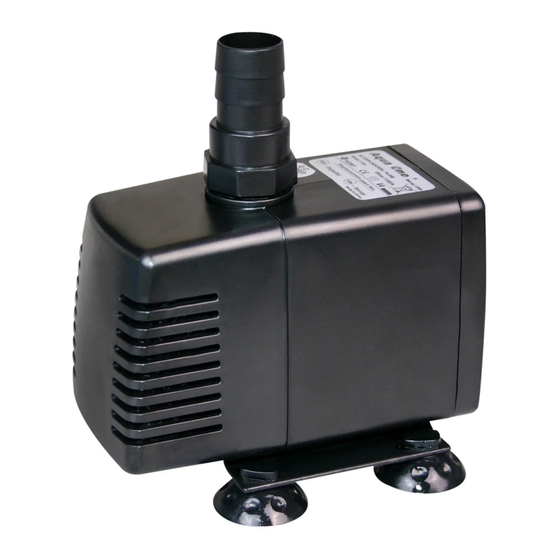Aqua One moray 2300 Manuel - Page 9
Parcourez en ligne ou téléchargez le pdf Manuel pour {nom_de_la_catégorie} Aqua One moray 2300. Aqua One moray 2300 12 pages. Aquarium pumps
Également pour Aqua One moray 2300 : Manuel de l'utilisateur (12 pages)

GB
Installation 2300-4900
Before installation ensure the correct materials have
been prepared and the most suitable pump position has
been selected. As with all water pumps, the greatest
flow efficiency will be created through the shortest
length of pipe/hose and with the fewest number of
bends. Avoid reducing the size of the plumbing as this
will greatly reduce flow.
Note: flow is reduced less through 2 x 45° bends than
through a single 90° bend.
Flexible hose is recommended over rigid pipe as this will
reduce vibration of the pump. If using rigid plumbing, a
short piece of flexible hose between the pump and the
pipes will help to reduce vibration.
If there is a requirement to adjust the flow on your
pump, it is essential that in-line taps are used only on
the pressure (outlet) side of the pump. Restriction of
the suction (inlet) side of the pump can cause the motor
to overheat causing damage to the pump.
It is recommended that the strainer is used to prevent
fish or large objects from entering the motor unit
and damaging the impeller. Ensure the pump is fully
submersed to prevent air from entering the pump which
can result in significant loss of flow and potentially
cause damage to the motor.
If the pump is being used in a clean, animal free
environment the inlet elbow can be used. This gives
the pump the ability to pick up water from a lower point
reducing the risk of the pump running dry. NOTE: it is
always recommended that the pump be fully immersed
in water to avoid the unit overheating.
Maintenance
If these pumps are being used in salt water, they must
be checked regularly for buildup of calcium and other
deposits.
To maximise the life of your pump, it is recommended
to clean the pump casing and the impeller every 6-8
weeks or earlier if flow has decreased significantly.
Prior to cleaning, disconnect the pump from the
electrical power supply.
The casing of the pump and the strainer can be cleaned
with a firm brush. DO NOT USE DETERGENTS
AS THE USE OF THESE WILL BE POTENTIALLY
LETHAL TO AQUARIUM INHABITANTS. Any objects
on or around the strainer or inlet should be removed to
prevent potential blockages in the pump or damage to
the impeller.
Troubleshooting
LOW WATER FLOW
1. Check strainer, impeller and impeller chamber for
calcium buildup or other deposits or blockages.
water level
2. Ensure all taps or flow control valves are fully open.
3. Clean plumbing lines to and from the pump.
NO WATER FLOW
inlet elbow
1. Ensure all taps or flow control valves are fully open.
2. Check that maximum head height has no been
exceeded. Consider all bends and horizontal plumbing
when calculating head height.
3. Check impeller and shaft for damage.
PUMP IS NOISY
1. Ensure suction cups are correctly positioned.
2. Check for blockages on the pump inlet. Restriction of
inlet can cause vibration.
3. Check for damage to impeller or shaft.
10
